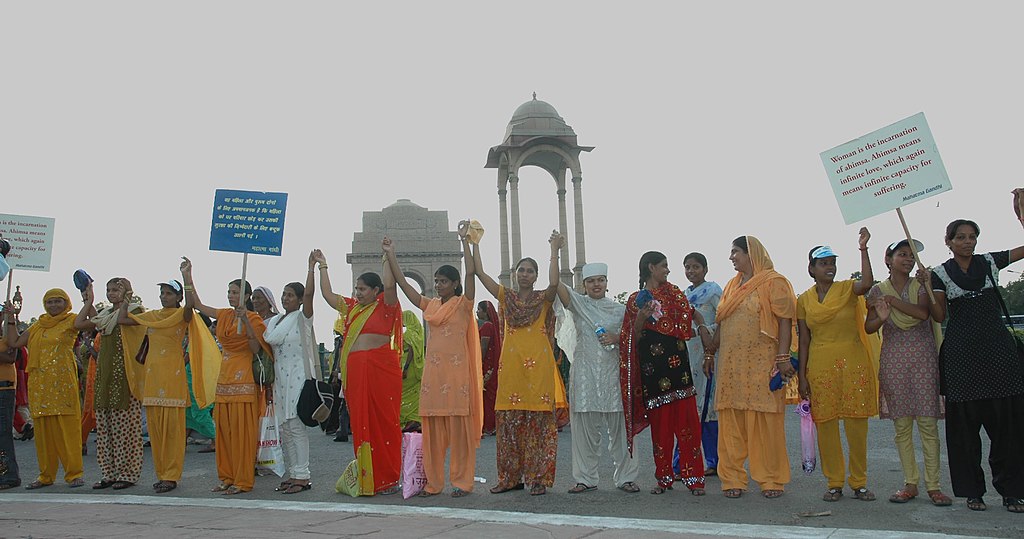Delhi has long been under the spotlight for its efforts to combat crimes against women. From the infamous Nirbhaya case in 2012 to everyday instances of harassment and abuse, the city has witnessed both horrifying challenges and significant strides toward justice. This blog explores the major laws designed to protect women, legal remedies available to them, and the steps women can take to safeguard their rights in Delhi.

A formation of human chain at India Gate by the women from different walks of life at the launch of a National Campaign on prevention of violence against women, in New Delhi on October 02, 2009.
Prevalence of Crimes Against Women in Delhi
According to data from the National Crime Records Bureau (NCRB), Delhi consistently reports a high number of crimes against women, including rape, molestation, domestic violence, and acid attacks. Crowded public spaces, unsafe commuting options, and systemic social challenges often exacerbate these crimes. However, awareness of legal protections and remedies can empower women to stand against these injustices.
Key Laws Protecting Women in India
India has enacted several laws to address violence and discrimination against women. Below are some of the key legal provisions applicable in Delhi:
Protection Against Sexual Harassment
- Section 354 IPC (Outraging Modesty): This section penalizes acts such as stalking, lewd gestures, or physical assault with the intent to outrage a woman’s modesty.
- The Sexual Harassment of Women at Workplace (Prevention, Prohibition and Redressal) Act, 2013: Also known as the POSH Act, this legislation provides a framework for addressing workplace harassment. Every organization in Delhi is mandated to establish an Internal Complaints Committee (ICC) for grievance redressal.
Laws Against Sexual Assault
- Section 376 IPC (Rape): This section criminalizes rape, providing severe punishments, including life imprisonment or the death penalty in extreme cases. Amendments made after the Nirbhaya case have strengthened this law.
- The POCSO Act (Protection of Children from Sexual Offenses): This law provides comprehensive protection for minors subjected to sexual violence.
Protection from Domestic Violence
- The Domestic Violence Act, 2005: This law addresses physical, emotional, sexual, and economic abuse within households. Women can seek protection orders, monetary relief, and custody rights under this act.
Laws Against Dowry and Cruelty
- Section 498A IPC: This provision criminalizes cruelty by a husband or his relatives, including dowry harassment.
- The Dowry Prohibition Act, 1961: This act prohibits the giving or receiving of dowry and imposes penalties for violations.
Acid Attack Laws
- Section 326A IPC: Specific provisions address acid attacks, with stringent punishments, including imprisonment of up to 10 years or life. Victims are also entitled to government compensation for medical treatment and rehabilitation.
Cyber Laws for Online Harassment
- Under the Information Technology Act, 2000, provisions like Section 67 (publishing obscene material online) and Section 66E (violation of privacy) address issues of cyberstalking, revenge porn, and trolling.
Legal Remedies Available to Women in Delhi
Filing an FIR
Women can lodge a First Information Report (FIR) at the nearest police station for any cognizable offense. Delhi Police also operates all-women police stations in many areas, ensuring a safer and more supportive environment for victims. FIRs can also be filed online through the Delhi Police website or mobile app.
Approaching Women’s Courts
Delhi has dedicated Mahila Courts that handle cases involving crimes against women. These courts expedite proceedings and ensure sensitivity toward victims during trials.
Accessing Helplines and Support Services
- Women’s Helpline Number 1091: Operated by Delhi Police, this helpline provides immediate assistance.
- Sakhi One-Stop Centers: These centers offer medical, legal, and counseling services to survivors of violence.
- Himmat Plus App: A mobile application by Delhi Police that allows women to send SOS alerts during emergencies.
Seeking Compensation and Relief
Under various laws, victims are entitled to financial compensation, medical aid, and other forms of relief. For instance, the Delhi government provides monetary support to acid attack survivors and rape victims through schemes like the Delhi Victim Compensation Scheme.
Challenges in Combating Crimes Against Women
Despite a robust legal framework, ensuring justice for women in Delhi remains a challenging task. One of the primary issues is the underreporting of crimes, as many women hesitate to come forward due to fear of societal stigma, retaliation, or a lack of trust in the justice system. Even when cases are reported, prolonged trials and procedural delays often discourage victims and impede their pursuit of justice. Additionally, a significant number of women are unaware of their rights and the legal protections available to them, which further prevents them from seeking timely help or taking action against perpetrators.
How Women Can Protect Their Rights
Women can take several proactive steps to protect their rights and ensure their safety. Understanding key legal provisions is crucial, as knowledge empowers women to take action when their rights are violated. Leveraging technology, such as using apps like Himmat Plus and accessing emergency helplines, can provide immediate assistance during distressing situations. Reporting crimes promptly is equally important, as timely action can prevent further harm and ensure accountability. Women should also seek support from counseling and legal aid services available through organizations like the Delhi Commission for Women (DCW), which offer comprehensive assistance to survivors of violence.
Conclusion
While crimes against women remain a critical issue in Delhi, the legal system has made significant strides to address these challenges. Awareness and timely action are crucial in ensuring that women are protected and perpetrators are held accountable. By utilizing the laws and resources available, women in Delhi can stand up against violence and seek justice effectively.
If you have questions about legal remedies for crimes against women or need more information, feel free to share your thoughts in the comments below.
